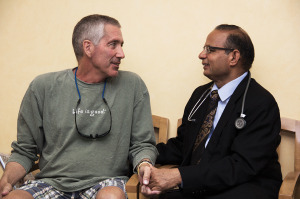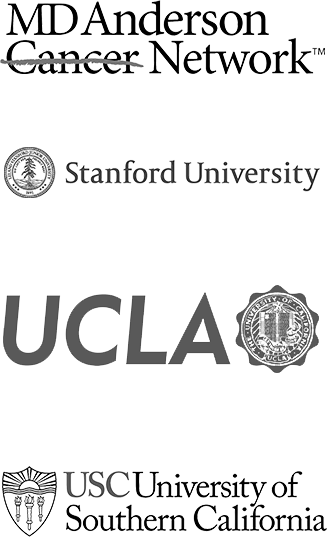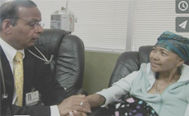Genitourinary Cancers
The genitourinary system is also known as the urogenital system and is comprised of the reproductive and urinary organs which includes the kidneys, bladder, prostate, testes and penis. Kidney and bladder cancers are discussed in another section, so this article will focus on the the male genital system.
Genitourinary Cancer Overview
The genitourinary cancer’s location in the male genital system affects treatment options and prognosis:
Prostate Cancer– These typically begin in the prostate’s gland cells adenocarcinomas.
Testicular Cancer – Younger men are more likely to have this disease and this is the most diagnosed cancer in men from 20 to 34 years of age. Early detection accounts for a 99% treatment success. There are two types: Germ cell tumors which occur in the cells that produce sperm., and stromal tumors which occur in the testicular tissue where hormones are produced.
Penile Cancer – The penis contains several types of cells and this form is classified by the type of cells in which it develops. There are five main types of penile cancer which include sarcoma, melanoma and basal cell.

The best strategy for these diseases is early diagnosis when cancer is highly treatable. Familiarity with the signs and symptoms of the disease and sensitivity to any physical changes are all helpful towards early detection. Symptoms do not necessarily mean genitourinary cancer, but consulting a specialist is highly recommended.
Our Los Angeles oncology and cancer center applies a multi-disciplinary approach to cancer care working with prestigious specialists from other well-known medical institutions. Our LA physicians, including Dr. Sant Chawla, are dedicated to life-saving tumor treatments and have access to the most advanced therapies through our pioneering efforts in clinical research. We encourage our patients to participate in their own medical care and work closely with them throughout treatment.
Symptoms
Symptoms vary and are determined by the area where the disease develops. However, the existence of any of these symptoms does not necessarily signify genitourinary cancer, but a doctor should always be consulted for a correct diagnosis. If it is genitourinary cancer and symptoms are ignored, it could progress to an advanced stage and less easily treated. The most common symptoms for this genitourinary cancer type are:
- Prostate Cancer
Inability and difficulty starting urination
Painful or burning urination
Blood in urine or semen
Painful ejaculation
Area of back, hips, or upper thighs stiff and painful - Testes Cancer
Pain in the testes or scrotum
Scrotum has a heavy feel
Lower belly or groin has dull pain or pressure
Both or one of the testes has a lump or swelling - Penile Cancer
Reddish rash
Small, crusty bumps
Open sore that doesn’t heal
Swelling or skin change of the penis
Groin’s lymph nodes are swollen
Wart-like growth or lesion
If a genitourinary cancer is suspected, a doctor would first conduct a physical examination with a medical history review to detect patient’s risk factors. Depending on the outcome of the physical, next step would be diagnostic tests and/or biopsies of tissue.
Treatment
Depending on the stage of the disease and other factors, treatment options can include one and possibly a combination of the following:
- Surgery
- Radiation therapy
- Chemotherapy
- Targeted therapies
It is critical for a patient to first discuss all treatment options as well as possible side effects with the medical team.
When developing a treatment plan, we first evaluate the stage and grade of the tumor, previous treatments (if any), extent of the genitourinary cancer, biopsy results, and other unique factors. We design effective multi-modal treatment plans for our patients collaborating with prominent pathologists, surgeons, radiologists, and radiation oncologists from well-known facilities such as UCLA, USC, Stanford, M.D. Anderson, St. John’s and Cedars Sinai. We are able to exceed standard treatment through our work in advanced clinical research giving us access to the most novel sarcoma and tumor drugs.
Additional information about prostate cancer can be found at WebMD.com.
Clinical Trials
 Cancer Center physicians continue as lead investigators of numerous clinical trials working with novel drug therapies. Through this involvement, we can offer a comprehensive treatment plan based on each patient’s individual needs.
Cancer Center physicians continue as lead investigators of numerous clinical trials working with novel drug therapies. Through this involvement, we can offer a comprehensive treatment plan based on each patient’s individual needs.
We are recognized as pioneers in numerous clinical drug trials, and through this work, we have access to the most novel drug therapies for our patients. We have led successful research for two soft tissue sarcoma therapies Aldoxorubicin and Pazopanib and Eribulin for metastatic breast cancer. Dr. Chawla was the international principal investigator of Dasatinib (SARC009), a clinical trial sponsored by the Sarcoma Alliance and approved by the FDA. Dasatinib is considered the most effective treatment for advanced osteosarcoma (type of bone cancer).
Contact the Oncology Experts for More Information
Our patients’ emotional and physical well-being come first. We have an expert team of cancer specialists who are committed to offering our patients the most advanced medical care through our novel drug therapies and multi-modal treatment approach. Contact our center today at 310-552-9999 to schedule a consultation with one of our Los Angeles oncologists.
Next, read about breast cancer.



